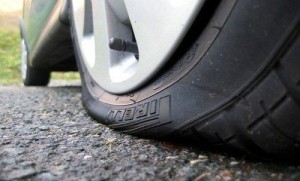
Sure, flat tires happen from time to time. But good tire care can prevent a tire disaster from happening.
It’s no secret that taking care of your tires will allow them to last longer. The same is true with most things in life. To keep your tires at their optimum, make sure to check them monthly for tire wear, proper tire pressure, and any damage that would indicate that your tires would need to be replaced. Here are a few tire care tips to keep in mind this year in order to keep your tires, and your fleet, running at their best:
1. Consider the Load When Looking a Tire Pressure – Tire footprint and traction are reduced when van, pickup or RV tires are over inflated for the loads carried. In particular, tires with aggressive tread patterns may contribute to oversteer or “roadwalk” if inflated beyond the inflation pressure specified in the Owner’s Manual and vehicle placard for standard or customary loads. Over inflation also increases the chances of bruise damage. Higher inflation pressure increases stiffness which may deteriorate ride and generate unwanted vibration. If worried about over inflation when on the road, make sure to check the tire pressure when they are cool and not right after a drive.
2. Tire Care is Also a Safety Issue – Under inflation is the most common cause of failures in any kind of tire and may result in severe cracking, component separation or “blowout,” with unexpected loss of vehicle control and accident. Under inflation increases sidewall flexing and rolling resistance resulting in heat and mechanical damage. Also keep in mind that under inflation reduces a tire’s ability to support the vehicle’s load and transmit cornering, braking and acceleration forces, which could increase the chances of a flat tire or a tire blowout.
3. Check Tire Pressure Regularly – Although nitrogen tire inflation maintains proper tire pressure for a longer period of time, it is not meant to be a replacement for good tire care and regular maintenance. For managed fleets, tire pressure should be checked weekly, as under inflated tires not only increase safety risk, they also reduce your fuel efficiency and end up costing you money. There’s should be no substitution for safety.
With these three tips in mind, managed fleets should have an excellent 2012 with their vehicles.





